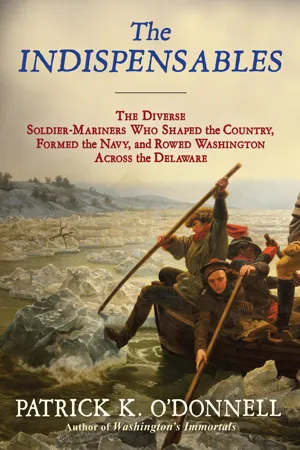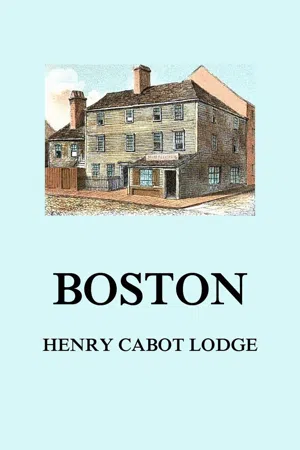Boston Massacre
The Boston Massacre was a violent confrontation on March 5, 1770, between British soldiers and a crowd of colonists in Boston, Massachusetts. The incident resulted in the death of five colonists and heightened tensions between the American colonies and Britain, ultimately contributing to the outbreak of the American Revolutionary War.
5 Key excerpts on "Boston Massacre"
- eBook - ePub
- William C. Banks, Stephen Dycus(Authors)
- 2016(Publication Date)
- Harvard University Press(Publisher)
...They were also pelted with snowballs, sticks, and stones. When some thrown object struck one young soldier, he fired his musket into the crowd—almost surely by accident. But in the ensuing confusion the other soldiers discharged their weapons as well. Three people in the crowd, including a runaway slave named Crispus Attucks, died immediately; two others later succumbed to their injuries. Order was restored only after an appeal from the acting governor. The Boston Massacre, as the incident became known, marked a critical turning point in the American colonists’ quest for independence. A painting depicting the scene was engraved by Paul Revere, printed, and circulated widely, further inflaming passions. The British troops departed Boston soon thereafter. When the Declaration of Independence was drawn up six years later, it set forth a long list of grievances against King George III. Prominent among these were that he had “Quarter[ed] large bodies of armed troops among us,” and more generally that he had “affected to render the Military independent of and superior to the Civil power.” These words were surely inspired by the Boston Massacre and the events surrounding it. In fact, the Declaration reflected a long history of military meddling in civilian affairs. Its signers were also familiar with centuries of conflict over domestic deployments of troops in the mother country. Even after Magna Carta guaranteed the right to due process of law in 1215, British monarchs used soldiers to keep subjects in line, as Parliament struggled to set limits on the Crown. Our Founding Fathers thus regarded standing armies as potential instruments of autocracy and abuse. America’s early leaders nevertheless worried about “domestic tranquility” long before it became part of our Constitution’s preamble. External threats from Native Americans and European adversaries abounded...
- eBook - ePub
Mightier than the Sword
How the News Media Have Shaped American History
- Rodger Streitmatter(Author)
- 2018(Publication Date)
- Routledge(Publisher)
...The colonists resented the presence of even these few soldiers. On March 5, 1770, several young colonists gathered outside the British Custom House and threw snowballs at the guards. After some time passed, one of the colonists hit a soldier with a club, knocking him to the ground. The soldier discharged his musket, possibly by accident as he fell, and the bullet struck a colonist. Action then escalated, with the colonists swinging clubs and the British firing guns. By the end of the melee, five colonists were dead and the incident became known as the Boston Massacre. Adams shrieked with outrage when the trial of the British officer and six of his men involved in the incident led only to light punishments. Five of the men were exonerated, and the two others were ordered merely to have their hands branded. Writing angrily in the Gazette, Adams labeled the British soldiers “barbarous & cruel, infamously mean & base.” 13 The most incendiary material about the massacre didn’t follow immediately after the trial, however, but in later years. That rhetoric appeared primarily in the form of one-page fliers that were produced more quickly than multipage pamphlets. Tacked at night on trees and the doors of neighborhood taverns, these fliers were read aloud to groups of colonists, and so their influence spread far beyond literate men and women. Typical were the histrionic words distributed widely on the second anniversary of the 1770 event...
- eBook - ePub
The Boston Massacre
A Family History
- Serena Zabin(Author)
- 2020(Publication Date)
- Mariner Books(Publisher)
...As for Captain Preston, he did not even wait for his soldiers to embark for their next posting; he sailed for England the morning after the verdict. Ten months after the deaths in King Street, the trials had not solved the question of who was to blame for the shooting. But in creating a new image of Boston, they did other important work. They showed Americans that British soldiers stood on one side of a chasm and colonial civilians on the other. By downplaying the plentiful evidence, given by witnesses on both sides of the case, of longstanding connections between town and Crown, the trials made clear that the concept of a cross-cultural community no longer had a place in the story of the Boston Massacre. It easily could be removed from the picture of life in the British Empire. With his usual immodesty, John Adams later commented that the verdicts of the two trials were “exactly right.” There is no need to agree with him; the trials never did settle the question of blame, the evidence was contradictory, and Adams managed to pick juries that no one then or now would call impartial. In the end, however, even if we had the ability to ascribe responsibility for those deaths 250 years ago, the answer would bring us no closer to understanding how the massacre brought us to the American Revolution. Focusing on the question of responsibility leads us down the wrong path. It conflates the events of March 5, 1770, with the political, legal, and even literary maneuvering that immediately followed. And the ultimate end of that political spin was to erase the shared lives of soldiers and civilians—even, sometimes, in their own memories. Just three months after the soldiers’ trial ended, Boston officials began to commemorate the Boston Massacre with an oration, an event that became an annual celebration. In the second annual oration, held in 1772, Dr...
- eBook - ePub
The Indispensables
The Diverse Soldier-Mariners Who Shaped the Country, Formed the Navy, and Rowed Washington Across the Delaware
- Patrick K. O'Donnell(Author)
- 2021(Publication Date)
- Atlantic Monthly Press(Publisher)
...C HAPTER 3 M ASSACRE AND T EA March 1770, Marblehead, Massachusetts It began, “A few minutes after nine o’clock four youths, named Edward Archbald, William Merchant, Francis Archbald, and John Leech, came down Cornhill together, and separating at Doctor Loring’s corner, the two former were passing the narrow alley leading Mr. Murray’s barrack in which was a soldier brandishing a broad sword of an uncommon size against the walls, out of which he struck fire plentifully.” 1 The story appeared in the March 12, 1770, edition of the Boston Gazette and made its way the fifteen or so miles to Marblehead. In its few short pages, John Glover and others read the account of the event that came to be known as the Boston Massacre. The pages revealed how the young men and the soldiers pushed and struck at one another with a variety of makeshift weapons. Then, “on hearing the noise, one Samuel Atwood came up to see what was the matter; and entering the alley from dock square, heard the latter part of the combat; and when the boys had dispersed he met the ten or twelve soldiers aforesaid rushing down the alley towards the square and asked them if they intended to murder people? They answered Yes, by G-d, root and branch! With that one of them struck Mr. Atwood with a club which was repeated by another; and being unarmed, he turned to go off and received a wound on the left shoulder which reached the bone and gave him much pain.” Soon more people came out into the streets, and the soldiers responded by charging with their bayonets. Agitated, the Bostonians, many of them young men, yelled in defiance and, “it is said, threw snow balls. On this, the Captain commanded [the Redcoats] to fire; and more snow balls coming, he again said, damn you, fire, be the consequence what it will!” It was over within minutes. “By this fatal manoeuvre three men were laid dead on the spot and two more struggling for life,” the Gazette reported. “The dead are Mr...
- eBook - ePub
- Henry Cabot Lodge(Author)
- 2018(Publication Date)
- Jazzybee Verlag(Publisher)
...CHAPTER IX. REVOLUTION. The lesson of the riot in Boston streets seems plain enough now, yet the British ministers took no heed either of the meaning of the massacre itself or of the conduct of the people afterward. They seemed unable to perceive that an outbreak of this sort among such a people, ending as this had done in bloodshed, cut very deep into the ties which bound the country; that it drew, in fact, a line between the colonies and England which it would be difficult to obliterate and impossible to forget. Blind also they were to the character of the people with whom they had to deal. Riots were familiar things to any man who had dwelt in great cities; but the rising of the citizens of a town consequent upon an affray with the troops, the removal of the soldiers compelled by the stern attitude of these same Boston people, and then the evidence of outside power being thus ordered out of the town, the calm proceedings in the civil courts, where the men who had shed blood in the streets received a fair and impartial trial, were not common occurrences, and deserved to be carefully pondered. A people at once so determined and so self-restrained, so ready to resist a law which they deemed wrong and unconstitutional, and yet so intensely law-abiding, ought to have called to the mind of the English ministry a fact which they apparently never remembered: that these Massachusetts colonists were of their own race and of their own flesh and blood, descended from the very men who had driven the Stuarts from England, and given her in their stead the greatest of her rulers. Very unfortunately for themselves and for England the ministry were totally incapable of perceiving these facts, which are now plain to anyone who reads the history of that time...




